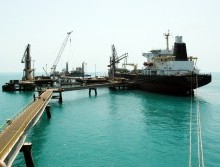
Oil prices are going up—is Yemen fighting a key reason? Oil Tanker. Illustrative. Photo Courtesy of U.S. Navy. Photo by Mass Communication 2nd Class Nathan Schaeffer
Just when things didn’t seem to get much worse in Yemen—which sits along a key shipping lane for oil tankers—the civil war there has given room for al-Qaeda’s affiliate in the country to take control of multiple major facilities in southern Yemen. The BBC reported that the group known as al-Qaeda in the Arabian Peninsula (AQAP) has taken control of an airport according to officials.
AQAP has also reportedly taken an oil terminal and a seaport, and previously it broke prisoners out of a prison. The situation comes as a coalition of mostly Arab nations led by Saudi Arabia is engaged in a bombing campaign trying to help the Yemeni government to regain control in a fight with Iranian-backed Yemeni rebels, known as the Houthi. Since the Houthi started it all, the US is blaming the al-Qaeda success on them.
“I think in general… the security situation or lack of security situation on the ground in Yemen has given viagra online manchester space for AQAP to operate, certainly,” said spokesperson Marie Harf in comments released by the US State Department.
“I mean, they’ve had space for a while to operate there, but the security situation caused by the Houthi and former President [Ali Abdullah] Saleh’s actions—taking over of territory, forcing the government out—physically out—has led to the security situation on the ground there.”
Despite the fact that the Saudi-led air strikes haven’t yet beaten back the rebels, the current Yemeni leadership is “hoping” a Saudi-led ground offensive won’t be needed, according to comments from Yemeni Vice-President Khaled Bahah quoted by the BBC.
The BBC noted that AQAP is fighting both the Yemeni government and the rebel Houthis, and now they have access to key facilities. Harf opposed the idea that the Saudi strikes were what enabled the AQAP to make their gains.
“They’re not the ones responsible for creating the security situation,” said Harf. “It’s the Houthis who are responsible for the destabilization that we’ve seen in Yemen. The… coalition is responding to that.”
(By Joshua Spurlock, www.themideastupdate.com, April 16, 2015)
